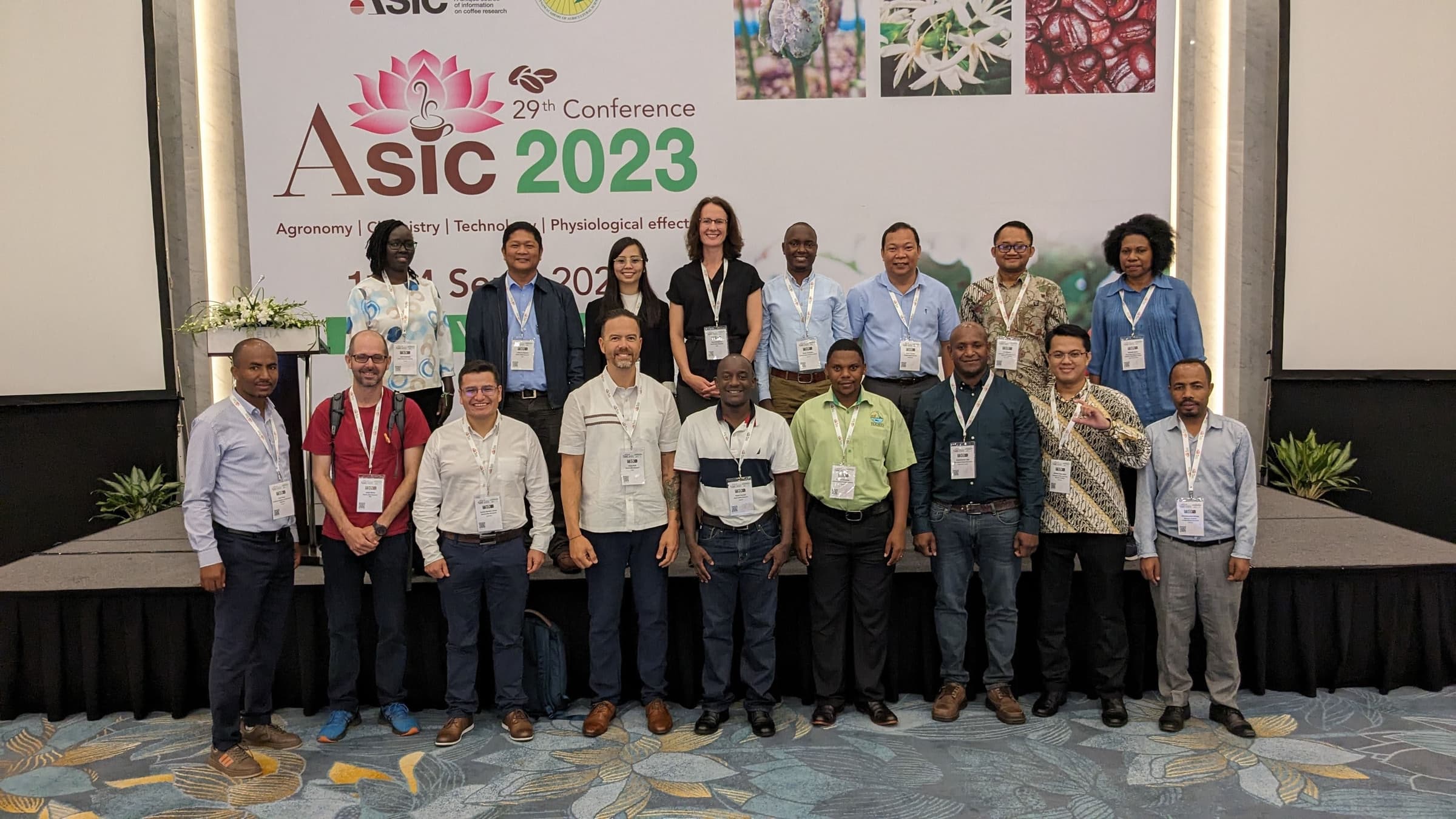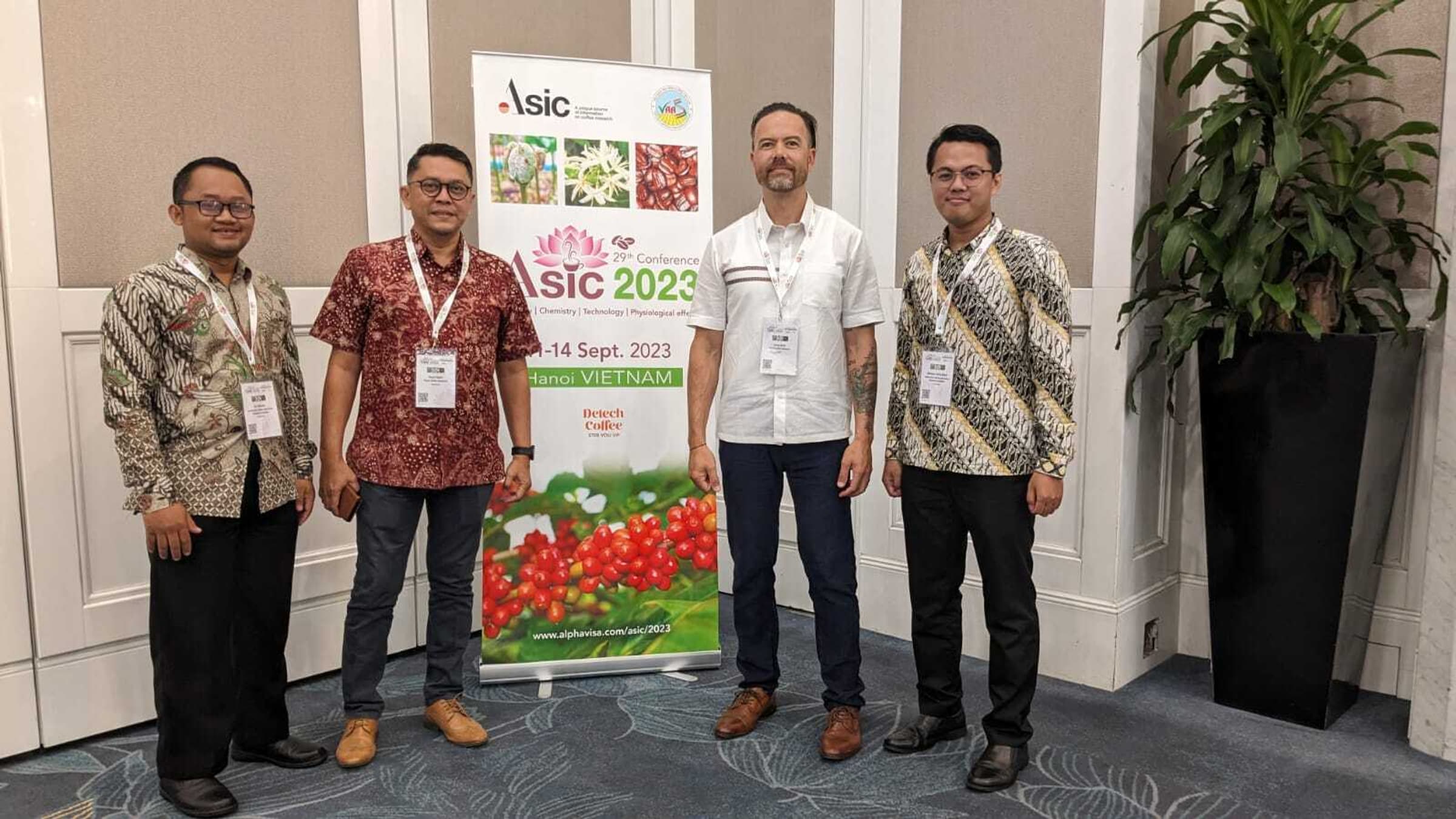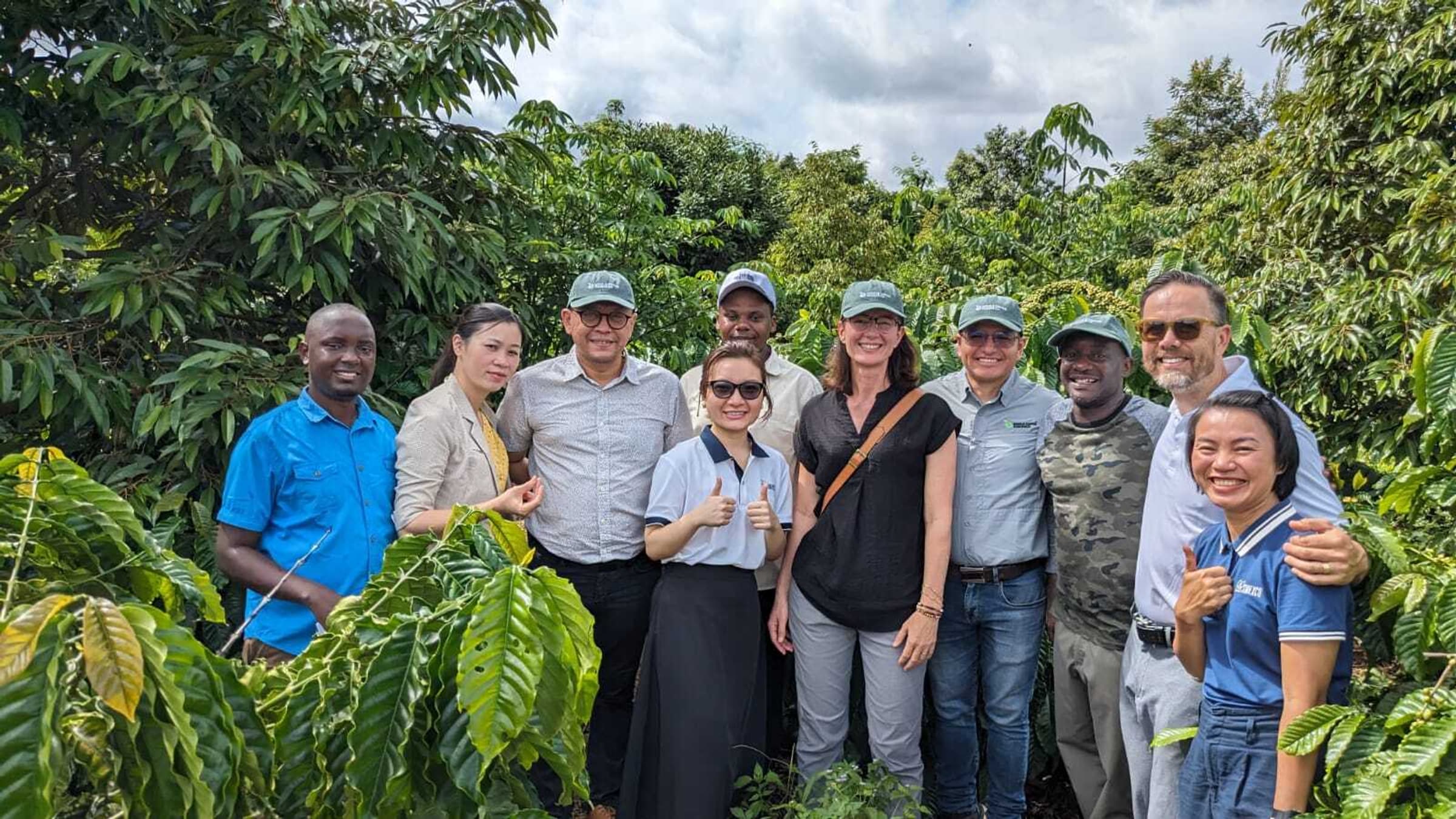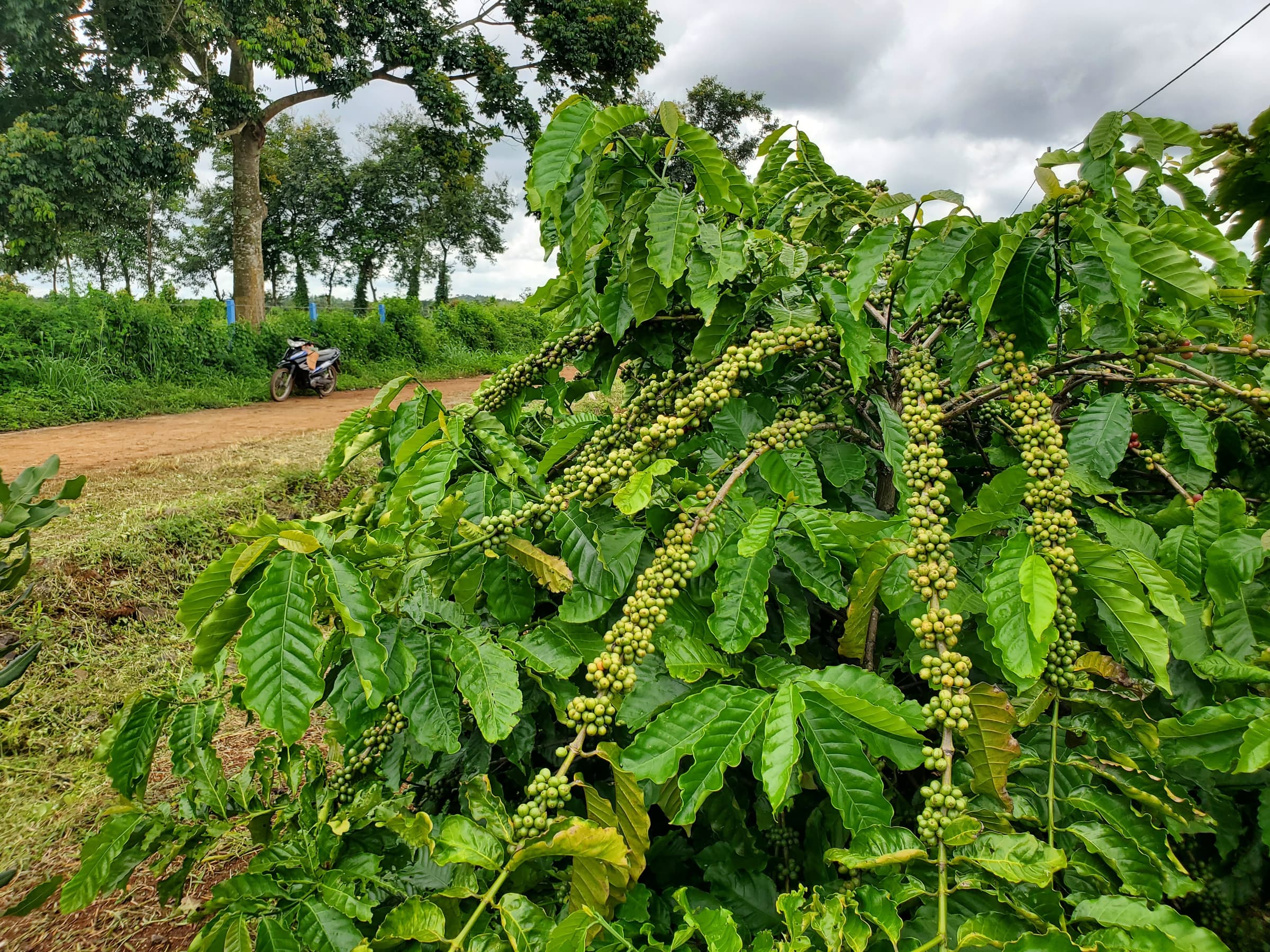Cultivating scientific exchange in Vietnam: a learning journey
World Coffee Research supports 13 researchers from producing countries to attend ASIC conference, learn about Vietnamese coffee production
In September, the World Coffee Research (WCR) team welcomed 13 scientists from producing countries around the globe—including Kenya, Uganda, Ethiopia, Indonesia, the Philippines, and Papua New Guinea—to Hanoi, Vietnam to attend the 29th biannual Association for Science and Information on Coffee (ASIC) conference. The conference provides specialists worldwide with the opportunity to gather and share their research on all aspects of coffee science and technology.
The effort to bring producing country researchers to the global scientific forum is part of WCR’s continued commitment to supporting national coffee institutes and strengthening their capacity for research and development (R&D). The travel was made possible by support from WCR member companies, U.S. Government funds, and the Philippine Coffee Advancement and Farm Enterprise (PhilCAFE) program.

World Coffee Research team members and hosted scientists pose for a group photo at the 29th ASIC Conference in Hanoi, Vietnam. Full list of participants available below.
"Without WCR’s support, such an incredible experience sharing and presenting would not have been possible.”
Attendees presented their own research to the global scientific audience (see summary of presentations below) and networked with top researchers across many scientific domains. At the conference, WCR team members Dr. Tania Humphrey, Director of R&D, Dr. Kraig Kraft, Asia & Africa Director, Drs. Robert Kawuki, Santos Barrera, and Jorge Berny, Research Scientists in Plant Breeding and Genomics, and Nuzul Qudri, Regional Project Manager for Asia, presented the latest results of WCR’s own ongoing programs and convened with the greater coffee community, including the 13 sponsored partners.
“This was my first international coffee conference and it was indeed an eye-opener to me as a person,” said Dr. Jane Cheserek, Research Scientist at the Kenya Agricultural and Livestock Research Organization’s (KALRO) Coffee Research Institute, “The conference was a wonderful platform where I got to meet other breeders, global scientists, and stakeholders within the coffee industry. I was able to create new networks during the conference and learn how breeding and other research programs are conducted in different coffee organizations. We are looking forward to adopting some of the lessons learned in our research programs.”

From left to right: Ari Wibowo (ICCRI), Nuzul Qudri (WCR), Dr. Kraig Kraft (WCR), and Dr. Miftahur Rizqi Akbar (ICCRI). Full list of participants available below.
Growing community and the future of coffee
Throughout the conference, the sponsored scientists and WCR team were able to hear from agronomists, geneticists, botanists, ecologists, sensory and health experts, and others comprising over 160 attendees from research organizations worldwide. This wide range of presentations allowed participants to gain exposure to the cutting-edge solutions being proposed to mitigate the myriad challenges currently facing the industry.
“It is clear that the global coffee industry is facing a number of challenges due to climate change, extreme weather, rising production costs, and dissatisfaction of coffee farmers,” said Dr. Kilfe Belachew Bekele, Senior Researcher at the Ethiopian Institute of Agricultural Research (EIAR)’s Jimma Agricultural Research Center (JARC), “To solve these challenges, international events like the ASIC conference are eye-opening and helpful for coffee scientists like me. This event allowed me to deepen my technical knowledge in coffee diseases and pest management, and enrich my professional network with globally known coffee pathologists, entomologists, and coffee stress management breeders.”
Several of WCR’s guests also had the chance to present their own research (see the full list of participants, posters, and presentations here) and make vital contributions to the growing body of knowledge of coffee agricultural science as countries collaborate to accelerate innovation. For instance, Dawit Merga Temesgen, Plant Breeding Researcher at EIAR’s JARC, presented a poster alongside his team. “[The experience] gave me a chance to learn many practical techniques, share experiences, and network with different researchers from universities, research institutes, and other stakeholders around the world, especially on coffee breeding and genetics,” said Temesgen, “Without WCR’s support, such an incredible experience sharing and presenting would not have been possible.”

World Coffee Research and hosted scientists visit robusta farm alongside staff from Simexco Daklak.
Bridging the gap in global coffee agricultural research
After the conference concluded, the group took part in a multi-day, multi-site immersive experience centered on breeding and production throughout Vietnam’s coffee-growing areas, including the central highlands, where ~80% of the country’s production is concentrated. The learning journey took the group to sites like the Eatu Fair Agricultural Service Cooperative and the Western Highlands Agriculture & Forestry Science Institute (WASI) research station, and to visit exporters Simexco Daklak. At each of these sites, the group toured farms and production facilities and deepened their understanding of both arabica and robusta cultivation throughout the country. The journey encouraged participants to observe practices and gain insight into interventions they may be able to utilize in their own research.
“[The experience] enriched my view of NaCORI’s current coffee research interventions in comparison to the world’s focus areas,” said Dr. Godfrey Sseremba, Programme Leader and Senior Research Officer of the Coffee and Cocoa Variety Improvement and Management Programme at Uganda’s National Coffee Research Institute (NaCORI), “My experience of the Vietnamese coffee research and production organization will inform how to best position NaCORI’s variety improvement to be more relevant to end users.”

Robusta seed plots at the Western Highlands Agriculture & Forestry Institute.
Many of the WCR team and the hosted scientists departed from Vietnam with a renewed sense of passion for their work and returned home ready to continue their efforts as members of the global community building a brighter future for coffee. “I feel I’m now part of a bigger community of like-minded professionals who have a lot to offer to the wider coffee communities and stakeholders throughout the world who depend directly—or indirectly—on coffee for survival, said Agronomist and Research Scientists Barth Apis of the Papua New Guinea Coffee Industry Cooperation, “I’m now going back with an improved perspective to further establish collaboration and networks both internationally and locally for the main purpose of adding to the coffee value chain.”
Participants
- Ari Wibowo, Indonesia Coffee and Cocoa Institute
AHERNT: The first commercial release yellow Arabica variety in Indonesia resulted from participatory local selection (Poster)
Genotyping of the First Yellow Arabica Coffee Variety ‘AHERNT’ Selected Through Participatory Breeding in West Java, Indonesia (Poster) - Dr. Miftahur Rizqi, Indonesia Coffee and Cocoa Institute
Sensory quality evaluation to produce excellent specialty arabica coffee derived from Indonesian germplasm collection (Poster) - Barth Apis, Papua New Guinea Coffee Industry Cooperation
- Michelle Bafeo, Papua New Guinea Coffee Industry Cooperation
- Dr. Godfrey Sseremba, Uganda National Coffee Research Institute
Viability of deficit irrigation pre-exposure in adapting Robusta coffee to drought stress (Poster) - Evans Atwijukire, Uganda National Coffee Research Institute
- Lemi Beksisa, Ethiopian Institute of Agricultural Research
Coffee (Coffea arabica L.) Breeding in Ethiopia: Achievements, Current status and Future Prospects (Poster) - Dawit Merga, Ethiopian Institute of Agricultural Research
Genetic Variability of Coffee (Coffea arabica L.) Germplasm in biennial bearing and its influence on selection efficiency (Poster) - Dr. Kifle Belachew, Ethiopian Institute of Agricultural Research
1. Chair of Session M1, Oral Presentations
2. Session S2-O-06 - Diversity and Antagonistic Potential of Mycoparasites on Coffee Leaf Rust Hemileia vastatrix in Ethiopia (Presentation)
3. Risk Factors Associated with Epidemics of Coffee Leaf Rust (Hemileia vastatrix Be & Br.) in Ethiopia (Poster) - Dr. Getachew Weldemichael, Ethiopian Institute of Agricultural Research
1. Session M2-O-06 - Variability and association between biochemical constituents and organoleptic quality attributing traits in Ethiopian coffee (Coffea arabica L.) accessions (Presentation)
2. Genotype by environment interaction and stability of Ethiopian coffee (Coffea arabica L.) genotypes collected from Wollega Coffee growing areas for quality attributes (Poster) - Dr. Jane Cheserek, Kenya Agricultural and Livestock Research Organization
Sensory evaluation of coffee varieties across two coffee agro-ecological zones in Kenya (Poster) - Jermaine Marie Ann O. Fabella, World Coffee Research, PhilCAFE
Genetic Differentiation of Coffea liberica Using SSR Marker Analysis (Poster) - Dr. Robert A. Rodolfo, World Coffee Research, PhilCAFE
World Coffee Research team
- Dr. Tania Humphrey, Director of Research & Development
- Dr. Kraig Kraft, Asia & Africa Director
- Dr. Jorge Berny, Research Scientist, Plant Breeding & Genomics
- Dr. Santos Barrera, Research Scientist, Plant Breeding & Genomics
- Dr. Robert Kawuki, Research Scientist, Plant Breeding & Genomics
- Nuzul Qudri, Regional Project Manager, Asia
- Ludovico A. Ramirez Jr., former Philippines Country Agronomist
Presentations and posters from World Coffee Research include:
- Session S1-O-07, The Innovea Global Coffee Breeding Network (Presentation)
- Validation and use of SNP markers for genetic compliance of commercial varieties in the coffee seed and nursery sectors (Poster)
- Tailoring the deployment of market-driven coffee varieties in Rwanda from the international multilocational varietal testing (Poster)